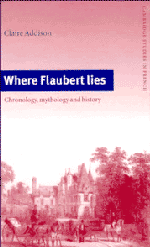Book contents
- Frontmatter
- Contents
- Publisher's note
- Acknowledgement
- Abbreviations and conventions
- Introduction
- 1 The Flaubert dates
- 2 The colours of time in the first Education sentimentale
- 3 Conception, birth, death in Madame Bovary
- 4 Heads and tails in Salammbô
- 5 Two-timing in L'Education sentimentale
- 6 The Hundred Days of Bouvard et Pécuchet
- 7 Petit dictionnaire de Flaubert
- Conclusion
- Diachronic and synchronic charts
- Bibliography
- Index
- Cambridge Studies in French
6 - The Hundred Days of Bouvard et Pécuchet
Published online by Cambridge University Press: 09 October 2009
- Frontmatter
- Contents
- Publisher's note
- Acknowledgement
- Abbreviations and conventions
- Introduction
- 1 The Flaubert dates
- 2 The colours of time in the first Education sentimentale
- 3 Conception, birth, death in Madame Bovary
- 4 Heads and tails in Salammbô
- 5 Two-timing in L'Education sentimentale
- 6 The Hundred Days of Bouvard et Pécuchet
- 7 Petit dictionnaire de Flaubert
- Conclusion
- Diachronic and synchronic charts
- Bibliography
- Index
- Cambridge Studies in French
Summary
PENULTIMATE SONGS
It is through Flaubert's tributes to the dead Bouilhet (11, 759–68) that the reader must approach BeP, for the homage to the poet whose life ‘a été trop confondue avec la mienne’ is Flaubert's profession of faith in the shared vocation which was also a shared life ‘Toute oeuvre d'art enferme une chose particulière tenant à la personne de l'artiste et qui fait, indépendamment de l'exécution, que nous sommes séduits ou irrités.’ There follows a criticism of Criticism that overlooks ‘l'intention de l'auteur’ in favour of ‘le contraire de ce qu'il a voulu’ and praise for Bouilhet's having ‘l'orgueil de ne montrer que sa modestie’.
Reading the preface to Bouilhet's Dernières chansons as a literary text is an act of discovery that reveals the pride of Gustave's own modesty. Once again, it is the anomalous dates which point to Gustave's attitudes, unconscious or otherwise: there are two ‘time lies’ in Flaubert's preface. The first concerns the death of Dr Flaubert (11, 761) and the second involves the date affixed to the preface: 20 juin 1870. Both concern a life which is ‘noble et laborieuse’, but that life belongs to Achille Cléophas and to Gustave as much as to the boeuf Bouilhet: ‘Ce fut dans ce temps-là, vers la fin de 1845, à mort de mon père, que Bouilhet quitta définitivement la médecine’. Dr Flaubert fell ill on 10 November 1845 (D47, 25) and died on 15 January 1846. For Gustave the end of labour is the end of life, and his own labour on the preface was prolonged beyond the 20 June 1870 he quotes as a completion date.
- Type
- Chapter
- Information
- Where Flaubert LiesChronology, Mythology and History, pp. 187 - 215Publisher: Cambridge University PressPrint publication year: 1996

